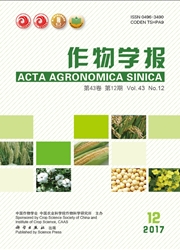

 中文摘要:
中文摘要:
为明确高温气候下Bt棉抗虫性下降的原因,以2个不同类型Bt棉品种为材料,2011年于盛蕾期设计38℃高温胁迫3、5和7 d;2012年设计38℃/25℃的昼夜变温胁迫4、7和10 d,研究其对转Bt棉蕾的杀虫蛋白表达量影响及其生理机理。结果表明,持续高温胁迫7 d内,棉蕾中Bt杀虫蛋白含量呈下降趋势,持续胁迫3 d内下降幅度最大,与未胁迫相比,泗抗3号和泗抗1号分别下降18.71%和26.54%;昼夜变温下高温胁迫4 d时蕾中Bt杀虫蛋白表达量无显著变化,当胁迫7 d以上时,Bt杀虫蛋白含量显著下降,泗抗3号和泗抗1号分别比对照下降11.32%和14.18%。持续高温或昼夜变温高温持续胁迫下,棉蕾中游离氨基酸含量和蛋白酶活性都显著增加,可溶性蛋白含量和GPT活性都显著下降。相关分析表明,游离氨基酸含量、蛋白酶活性与Bt杀虫蛋白含量呈极显著负相关;可溶性蛋白含量和GPT活性与Bt杀虫蛋白含量呈极显著正相关。分析表明,高温胁迫下蛋白质合成功能下降,分解能力增强导致可溶蛋白含量,包括Bt杀虫蛋白含量下降。常规种泗抗1号的抗虫性和氮代谢受高温的影响较大。
 英文摘要:
英文摘要:
To explore the reason for low insect resistance under high temperature climate in Bt cotton production, we selected two Bt cotton cultivars as experimental material with treatments of 38℃ for three, five and seven days in 2011, and 38℃/25℃ at day /night for four, seven and ten days, respectively at the artificial climate chamber in 2012. The results showed that the Bt insecticidal protein contents declined within seven days under 38℃, with the largest reduction occurred within three days. Compared with control, the square Bt insecticidal protein contents decreased by 18.71% and 26.54% for cultivar Sikang 3(SK-3) and Sikang 1(SK-1), respectively. Under 38℃/25℃ at day/night, the square Bt insecticidal protein contents had no obvious reduction within four days, and significant reduced after seven days with the reduction of 11.32% for SK-3 and 14.18% for SK-1. Under the treatment conditions the soluble protein contents, glutamate pyruvate transaminase(GPT) activities reduced, but the free amino acid contents, protease activities increased. There existed significant negative correlation of insecticidal protein content with free amino acid contents, and protease activities; and significantly positive correlation of insecticidal protein content with soluble protein contents, and GPT activities under high temperature stresses. Therefore, the reduced synthesis and the enhanced degradation for protein in the square under the high temperature condition resulted in the decrease of soluble protein content, including Bt insecticidal protein content. The larger reductions of the square Bt insecticidal protein content and nitrogen metabolic strength were detected in cultivar SK-1 as confound with cultivar SK-3 under the high temperature treatments.
 同期刊论文项目
同期刊论文项目
 同项目期刊论文
同项目期刊论文
 The Effects of the relative humidity on the insecticidal expression level of Bt Cotton during bollin
The Effects of the relative humidity on the insecticidal expression level of Bt Cotton during bollin 期刊信息
期刊信息
